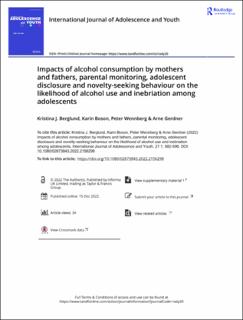Impacts of alcohol consumption by mothers and fathers, parental monitoring, adolescent disclosure and novelty-seeking behaviour on the likelihood of alcohol use and inebriation among adolescents
Peer reviewed, Journal article
Published version
Permanent lenke
https://hdl.handle.net/11250/3038494Utgivelsesdato
2022Metadata
Vis full innførselSamlinger
Originalversjon
10.1080/02673843.2022.2156298Sammendrag
The aim of this prospective cohort study was to examine how alcohol consumption by mothers and fathers, parental monitoring (knowledge, control, and solicitation), adolescent disclosure and novelty seeking were associated with the likelihood of alcohol use and inebriation among adolescents in three different age groups (13–14 years, 14–15 years, and 17 years). The results showed that alcohol consumption by parents is of significance for adolescent alcohol consumption (odds ratio mothers: 1.47 [1.17–1.84], odds ratio fathers 1.33 [1.08–1.65]) and inebriation, especially in the 17-year-old age group. The results showed that novelty seeking was a strong risk factor in all three age groups, while parental control and knowledge had no impact. This study shows that parental solicitation increased the odds at age 17 for alcohol consumption (2.64 [1.02–6.83]) and inebriation, while adolescent disclosure decreased the odds (0.18 [0.05–0.68]). In summary, the study shows that parents should be particularly attentive to adolescents with high novelty-seeking behaviour and that parental alcohol consumption influences adolescent alcohol habits.

